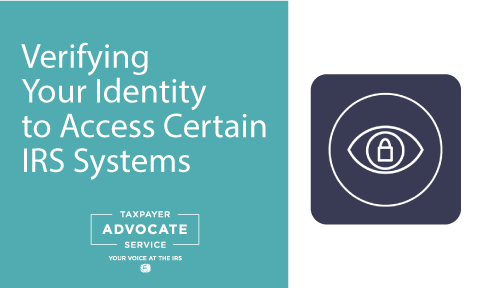

2/7/22 Update: IRS announces transition away from use of third-party verification involving facial recognition. See IRS.gov for more details.
IRS has updated how users sign in and verify their identity for certain IRS online services, with a mobile-friendly platform that relies on trusted third parties for authentication of identity and provides an improved user experience.
Secure Access Digital Identity (SADI) is the new platform that will replace Secure Access eAuthentication (eAuth) and is the modernizing identity proofing and authentication solution for public-facing IRS applications. SADI is expected to expand taxpayer access to online products and applications because it allows individuals to prove their identity by using expanded pieces of evidence such as:
You’ll also need to take a selfie with a smartphone or a computer with a webcam. If you use assistive technology such as a screen reader, or have trouble taking photos, you may need assistance to complete the process. More information can be found in the accessibility guide.
SADI uses Credential Service Providers (CSP) to conduct the identity verification and authentication process on behalf of the IRS. CSP uses common identity documents that taxpayers are more likely to have and moves away from financial credit checks.
The CSP provides its own customer service and offers an ID.me IRS Help Site for those taxpayers who fail to validate their identities through the initial steps and can help them complete the authentication process virtually with an CSP assistor.
SADI is now the platform for new registrations to use the following tools:
NOTE: Individual Taxpayer Identification Number holders may experience difficulties completing this identity verification process and may need to use alternative options, listed on IRS.gov, for each of these programs.
Existing eAuth users can log in to these tools with their current credentials until summer 2022. However, system messages may encourage you to create a new SADI login and password when using this older verification process earlier than that.
IRS and TAS call center professionals take great care to follow the law to ensure that they only discuss personal tax information with the taxpayer or someone the taxpayer properly authorizes to speak on their behalf. This requirement is not only required under the law but is in place to protect you and your tax related information. So, if you choose to call use this list to be prepared to verify your identity by having these items on hand when you call.
We recommend trying alternative methods to secure answers to common tax questions before calling the IRS. See a list of alternatives for securing common tax answers in this IRS message or visit the IRS’s Let Us Help You webpage for contact alternatives and help options.
Be aware it is not a function of the Taxpayer Advocate Service (TAS) to answer tax related questions. Our primary mission and purpose is to:
However, we do offer tax related information and Get Help web pages that contain information to help you help yourself to resolve some of the most common IRS issues. To see more information about TAS and what we do, visit our website.